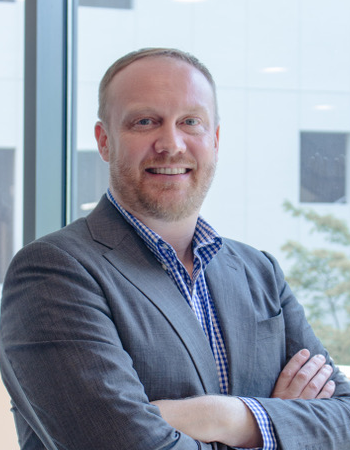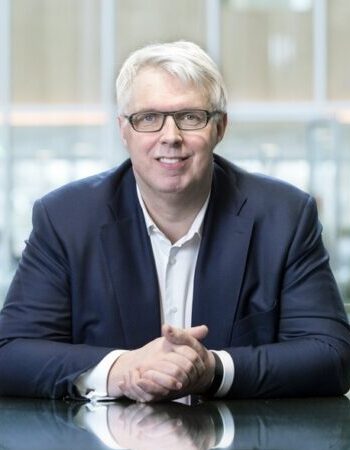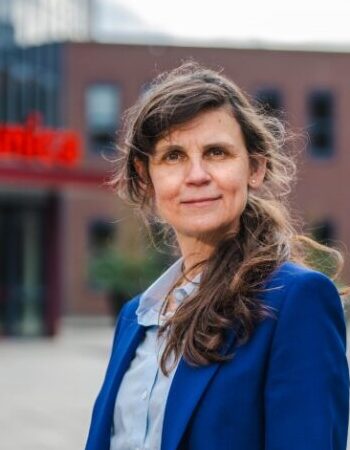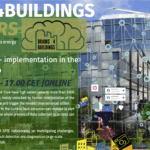Eindconferentie
- Home
- Eindconferentie



🗣️ Voertaal: Nederlands & Engels
👥 Doelgroepen: Onderzoekers, productontwikkelaars, installateurs, gebouweigenaren en gebouw- en facility managers geïnteresseerd in smart building solutions.
2025, markeert het einde van Brains for Buildings’ Energy Systems (B4B) project. Een bijna vijfjarig project dat zich richt op energiebesparing, gebruikerscomfort en flexibele energieaanpassing in utiliteitsgebouwen. Samen met industrieleiders zijn geavanceerde methoden en software plug-ins ontwikkeld, gebaseerd op big data, machine learning en AI. De eindconferentie benadrukt de praktische toepassing van deze innovaties en biedt een platform voor verdere marktacceptatie door onderzoekers, ontwikkelaars en gebouwbeheerders.
Dit event maakt onderdeel uit van de campagne TU Delft Energy for Impact. Bouw samen met ons aan het energiesysteem van de toekomst!
Programma
12:00Inloop met Lunch▼
13:00Welkom & Aftrap▼
13:10Opening Keynotes▼
Opening Keynote 1 - “AI is Not Magic: Understanding Capabilities While Cutting Through the Hype” (ENG)
The advancement of AI capabilities incites both excitement and anxiety in the built environment sector. In his talk Clayton will decompose the value chains of building design, construction, and operations in the context of new AI-driven tools. He will explore the prediction versus judgment paradigm while discussing the significant limitations of developing and using these tools.

Clayton is Associate Professor of Urban Informatics at Singapore Management University. He is an expert in building energy efficiency, data analytics, and smart buildings. He holds a PhD from ETH in Zurich and leads research to understand how data can transform built environment industries through open-access code, community-driven human-building interaction projects and data science skills.

Erik is eigenaar van MetisReal. Hij is een expert in slimme gebouwen, data-analyse en technologische innovatie. Hij werkte bij Philips, KPMG en Deloitte, waar hij mede het Digital Audit System ontwikkelde en CIO was voor IT- en Facility Management. Erik is bekend van Deloitte’s The Edge en het eerste commerciële smart building-platform op Azure Digital Twin. Hij zet data en AI in om gebouwen slimmer, adaptiever en duurzamer te maken.
14:10Parallelsessies Ronde 1▼
Sessie 1 - BRICK, SRI, GACS, LBD, NEN: Standards and Norms in Data, Implementations and Evaluations (ENG/NL)
Moderator: Pieter Pauwels (TU/e)
Achieving smart buildings and smart infrastructure relies on standards and norms. Without standards and norms, scalability is difficult to achieve, and efficiency often suffers. This session looks into product and process standards in relation to smart buildings. Data standards are presented, including Brick, Haystack, Linked Building Data en IFC. They are presented as part of a reference architecture for smart buidlings, including example implementations in the B4B project. Furthermore, NEN and CEN initiatives on standardisation are presented, in alignment with EU regulations. Ongoing developments in relation to the Smart Readiness Indicator (SRI) as well as GACS standardisation are discussed.- Ekaterina Petrova (TU/e)
- Stefan Hoekstra (The Green Village)
- Werner Vink (Renor)
Sessie 2 - Advances and future of Fault Detection and Diagnosis (ENG)
Moderator: Laure Itard (TUD)
This session explores the next frontier of Fault Detection and Diagnosis (FDD) in buildings — moving from research breakthroughs to practical implementation. Presenters from TU Delft, TU/e, Kropman and Spie will showcase recent advances in FDD developed within the Brains4Buildings project. Topics include leveraging occupants as “sensors” for fault diagnostics, identifying which sensors are truly essential in air handling units, and understanding where AI techniques can meaningfully enhance detection compared to rule-based methods. We start with an overview, and go on with discussions based on short pitches on main take-aways.- Chujie Lu (TU Delft): B4B journey: Recent advances in FDD
- Martín Mosteiro Romero (TU Delft) & Karzan Mohammed (TU/e): People as sensor for Fault Diagnostic
- Ziao Wang (TU Delft) & Vinayak Krishnan (Kropman): Essential sensors for FDD in Air Handling Units
- Srinivasan Gopalan (TU/e), Coen Hoogervorst (Spie) & Chujie Lu (TU Deflt): Where will AI help?
Sessie 3 - Making Building Flexibility Work: Predictive Control, Comfort & Capacity Planning (ENG/NL)
Moderators: Wouter Borsboom (TNO), Baldiri Salcedo Rahola (HHS)
This session delves into state-of-the-art methods for quantifying and exploiting energy flexibility in buildings. Speakers present model predictive control for peak load reduction and EV charging, day-ahead cooling flexibility, and predictive energy models for capacity planning. Participants will gain insight into practical deployment challenges and opportunities for integrating these approaches into design and operation workflows.- Yun Li (TU Delft): Flexibility assessment and predictive control while ensuring comfort constraints
- Shalika Walker (Kropman): MPC implementation for peak power consumption reduction, and EV charging
- Behrouz Eslamin Mossalam (TNO): Energy Flexibility of the Philips Building in Best: day ahead flexibility with cooling
- Kees Wisse (DWA): Energy Predictions models and their use in design tools for grid flexibility
15:10Pauze▼
15:40Parallelsessies Ronde 2▼
Sessie 4 - Designing for people: Energy efficiency and healthy indoor climate through user-centric interfaces (ENG)
Moderators:Olivia Guerra Santin (TU/e), Marleen Spiekman (TNO), Vera Lange (HAN)
Starting from an overview of user-related aspects that must be considered for a truly smart building, such as personalized control and the importance of actual user experiences on performance evaluation, we will dive into the role of feedback and control in building interfaces through an interactive session. We will introduce a practical approach and guidelines for interface selection, design and evaluation.- Olivia Guerra Santin (TU/e)
- Marleen Spiekman (TNO)
- Vera Lange (HAN)
Sessie 5 - Learning Community: Slimme oplossingen van onderzoek tot markt (NL)
Moderator: Edwin van Noort (DGBC)
Hoe zorgen we dat kennis uit onderzoek ook echt landt in de praktijk? En hoe maken we nieuwe inzichten breed toegankelijk voor professionals en de markt? In deze sessie van de #Brains4Buildings Final Conference ontdek je hoe de Learning Community van B4B invulling geeft aan kennisoverdracht en opleiding. We laten zien hoe de ontwikkelde learning track professionals wegwijs maakt in de wereld van slimme gebouwen, en hoe de opgedane kennis uit B4B concreet zijn weg vindt in herkenbare producten en diensten – zoals ISSO-publicaties.Highlights:
- The B4B Learning track: gratis toegankelijk en ontworpen voor iedereen die meer wil leren over slimme gebouwen (Stan Vanwersch | DGBC)
- Van onderzoek naar de markt: hoe B4B-kennis doorwerkt nieuwe ISSO-publicaties (Berend Koudstaal | ISSO)
Sessie 6 - Van researchfase naar business proposal (ENG/NL)
Moderator: Joep van der Velden (Kropman)
Deze sessie belicht de grote en snel in de praktijk te realiseren opbrengsten met de resultaten van het RVO MOOI B4B praktijkgericht onderzoek. Kropman en O-Nexus laten zien hoe geavanceerde monitoring en regeltechniek bijdragen aan gebouwoptimalisatie door hogere efficiëntie, meer energiezekerheid, CO₂-reductie, flexibiliteit en kostenbesparingen. Daarnaast toont Smart Buildings 4 Good Business hoe datagedreven regelstrategieën tegelijk de duurzaamheidsprestaties verhogen en tastbare zakelijke waarde genereren.- Jan-Willem Dubbeldam/Shalika Walker (Kropman): Nieuwe generatie van aansturing en inzicht van slimme gebouwen: InsiteSuite (ENG/NL)
- Bart Lelij (O-Nexus): CO₂-reductie in MKB-gebouwen met thermische buffers: de O-Nexus-aanpak (NL)
- Elena Chochanova (TNO) & Wim Maassen (RHDHV): Smart Buildings 4 Good (NL)
16:50Closing Keynote▼
“Altijd verloofd, nooit verbonden”, “Hoe de gebouwsector de bruiloft met technologie steeds weer uitstelt”
De sector staat op een cruciaal moment: de technologie is beschikbaar, maar de adoptie blijft achter. Wat is er nodig – van installateur, gebouweigenaar, techpartij en kennisorganisatie – om van Business for Buildings (B4B) een doorbraak te maken? Vanuit Unica wordt de praktijkervaring gedeeld, terwijl TVVL de essentiële rol van kennisverspreiding en het opbouwen van een vitale sector belicht. Dit is het moment om na te denken over de stappen die we moeten zetten om slimme gebouwen daadwerkelijk te realiseren.

Debby Slofstra
Chief Operation Officer (COO) Unica en Voorzitter TVVL
17:15Feestelijke Afsluiting▼
17:30Borrel▼
Keynote Sprekers


Dr. Clayton Miller
Associate professor of Urban Informatics at Singapore Management University. Clayton is an expert in building energy efficiency, data analytics, and smart buildings. He holds a PhD from ETH in Zurich and leads research at research team to understand how data can transform built environment industries through open-access code, community-driven human-building interaction projects and data science skills.


Debby Slofstra
Debby Slofstra is the Chairperson of TVVL and the Chief Operating Officer (COO) at Unica.


Erik Ubels
Erik is eigenaar van MetisReal. Hij is een expert in slimme gebouwen, data-analyse en technologische innovatie. Hij werkte bij Philips, KPMG en Deloitte, waar hij mede het Digital Audit System ontwikkelde en CIO was voor IT- en Facility Management. Erik is bekend van Deloitte’s The Edge en het eerste commerciële smart building-platform op Azure Digital Twin. Hij zet data en AI in om gebouwen slimmer, adaptiever en duurzamer te maken.


